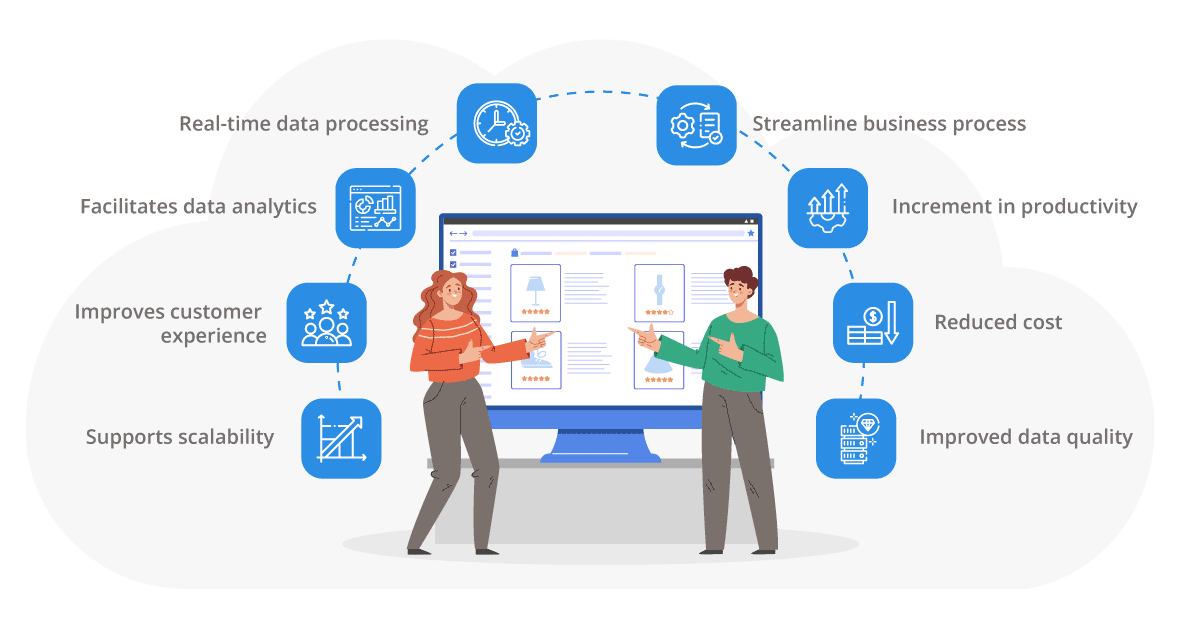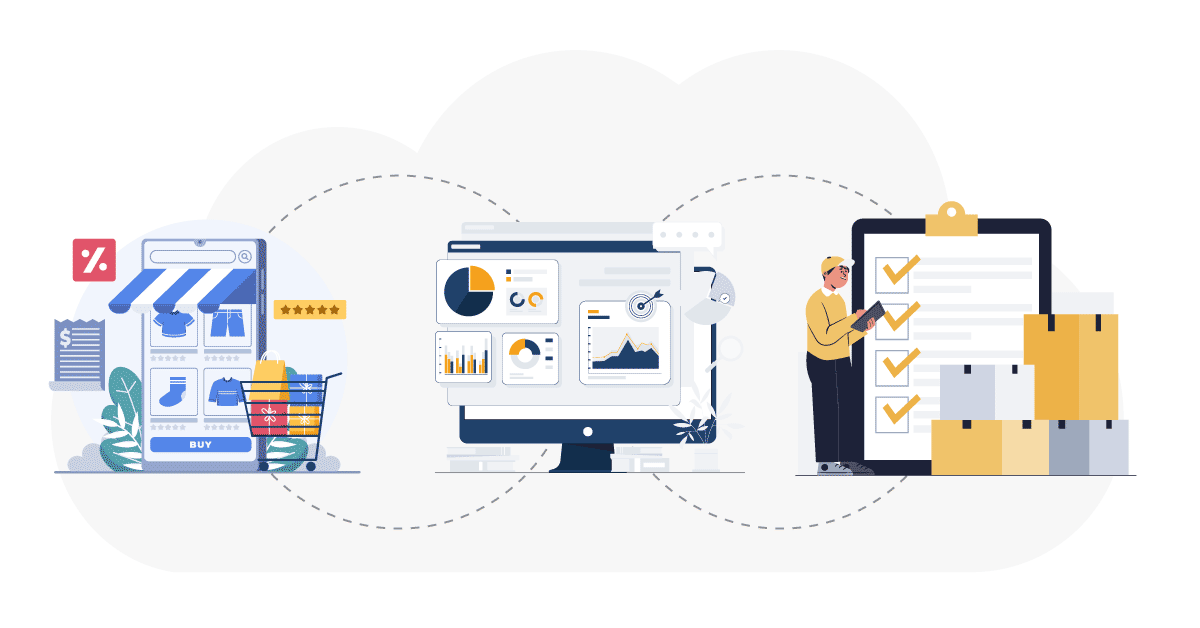As the world becomes increasingly digitized, businesses need to leverage innovative technologies to stay competitive. Integration Platform as a Service (iPaaS) is one such technology that can help businesses optimize their products and product features.
Before we proceed further, let’s first understand what is product optimization.
Aonflow iPaaS – Free for First 3 Months!
Build and run up to 1,500 transactions monthly with no cost. No payment info needed!
What is product optimization?
In today’s crowded marketplace, businesses must optimize their products and product features to stand out from the competition. Product optimization involves enhancing a product listing to make it more appealing to consumers, with the ultimate goal of making the product as credible and attractive as possible.
In the online marketplace, where countless products are available at consumers’ fingertips, businesses need to make their products stand out. This can involve improving the product’s design, functionality, or overall user experience. By doing so, businesses can create a more compelling product that resonates with their target audience.
Product optimization isn’t just about making a product look good. It’s about making it credible and trustworthy, too. Consumers today are more discerning than ever before and expect brands to be transparent about their products’ features and benefits. By providing accurate and detailed product information, businesses can establish trust with their audience and encourage them to make a purchase.
Another important aspect of product optimization is staying up to date with the latest trends and consumer preferences. By keeping a finger on the pulse of the market, businesses can ensure that their products are meeting the needs of their audience and staying ahead of the competition.
Ultimately, product optimization is about creating a product that resonates with consumers and compellingly meets their needs. By focusing on design, functionality, and credibility, and staying up to date with market trends, businesses can create products that stand out from the crowd and attract loyal customers.
When customers are considering making a purchase, the product description is often the next place they look to learn more about the product’s features and benefits. To ensure that customers feel confident in their decision to purchase, businesses should optimize their product listings by providing clear and accurate descriptions.
One important aspect of listing optimization is making sure that the product descriptions are consistent with the advertising platforms where the product is being promoted. This helps to establish credibility and build trust with potential customers. Additionally, it’s important to keep product descriptions at a moderate length, providing enough detail to inform customers without overwhelming them with information.
Customer feedback is another valuable tool for enhancing products. By paying attention to customer reviews, businesses can gain insights into what customers like and dislike about the product, and use that feedback to make improvements. It’s important to respond to negative feedback promptly, addressing any issues or concerns that customers may have.
Negative reviews can also be a red flag for potential customers, making them less likely to make a purchase. By proactively monitoring and responding to reviews, businesses can mitigate the impact of negative feedback and build trust with their audience.
Overall, optimizing product listings and monitoring customer feedback are essential steps for enhancing products and building a loyal customer base. By providing clear and accurate descriptions, responding to customer feedback, and proactively managing reviews, businesses can establish credibility, build trust, and ultimately drive sales.
How does an iPaaS step in to support product optimization?
An iPaaS platform provides businesses with a centralized, cloud-based platform for data integration, making it an ideal solution for product optimization needs.
Products and product features often require data integration from multiple sources and applications to be optimized effectively. This is where iPaaS can be a valuable solution. Here are some reasons why products and product features may benefit from iPaaS:
Streamlines business processes: iPaaS helps to streamline business processes by integrating various systems, applications, and data sources, eliminating manual data entry and reducing the risk of errors. This allows teams to focus on higher-value activities instead of spending time on repetitive and mundane tasks.
Increases productivity: By automating tasks and eliminating manual data entry, iPaaS helps to increase productivity and efficiency. This means teams can get more done in less time, allowing businesses to be more agile and responsive to customer needs.
Reduces costs: By automating tasks and reducing manual data entry, iPaaS helps to reduce costs associated with human error, data processing, and maintenance. This can result in significant cost savings for businesses, especially those with large and complex data integration needs.
Improves data quality: iPaaS ensures data consistency and accuracy by integrating data from multiple sources and cleaning and transforming it into a standardized format. This makes it easier to analyze and use data to make informed decisions about product development and optimization.
Enables real-time data processing: iPaaS enables real-time data processing by integrating data from various sources and making it available for immediate analysis and decision-making. This allows businesses to be more responsive to customer needs and market trends.
Facilitates data analytics: iPaaS enables businesses to analyze data from multiple sources, enabling them to make informed decisions about product development and optimization. This can lead to better product features, improved customer experiences, and increased revenue.
Supports scalability: iPaaS is scalable and can accommodate increasing volumes of data and integration requirements as businesses grow. This means businesses can use iPaaS to manage their data integration needs as they expand without needing to invest in additional IT infrastructure.
Enhances agility: iPaaS provides a flexible platform that enables businesses to adapt quickly to changing market conditions and customer needs. This means businesses can respond more quickly to new opportunities and challenges, helping them to stay competitive.
Improves customer experience: By optimizing products and features, iPaaS helps businesses deliver better customer experiences, which can lead to increased customer loyalty and retention. This is because customers are more likely to stay loyal to a business that meets their needs and provides a positive experience.
Boosts revenue: By optimizing products and features, iPaaS can help businesses increase revenue by creating products that better meet customer needs and preferences. This can lead to increased sales and customer retention, as well as improved profitability.
Enables rapid innovation: iPaaS enables businesses to rapidly develop and deploy new products and features, helping them stay ahead of competitors. This is because iPaaS makes it easier to integrate data and systems, enabling teams to focus on innovation and product development rather than spending time on manual data entry and processing.
Increases collaboration: iPaaS enables teams to collaborate more effectively by sharing data and insights, which can lead to more effective product development and optimization. This is because iPaaS provides a centralized platform for data integration, making it easier for teams to work together and share information.
Facilitates cross-functional integration: iPaaS enables integration across different departments and functions within a business, enabling better coordination and collaboration. This is important because cross-functional integration is essential for successful product development and optimization.
Reduces time-to-market: iPaaS enables businesses to develop and launch products more quickly, reducing time-to-market and helping them stay ahead of competitors. This is because iPaaS streamlines the product development process by automating data integration, enabling teams to focus on developing new products and features rather than spending time on manual data entry and processing.
Provides visibility into data: iPaaS provides visibility into data by integrating data from multiple sources and making it accessible in one place. This allows businesses to analyze data more effectively, identify trends and patterns, and make informed decisions about product development and optimization.
Aonflow is the leading integration platform.
You can kick-start by integrating your first-ever workflow in just a matter of minutes.
Enables integration with cloud-based services: iPaaS enables businesses to integrate with cloud-based services, such as Software as a Service (SaaS), Platform as a Service (PaaS), and Infrastructure as a Service (IaaS), making it easier to manage and access data across different systems and applications.
Enhances security: iPaaS provides enhanced security features, such as data encryption and access controls, ensuring that data is protected from unauthorized access and cyber threats. This is important because data security is critical for businesses that handle sensitive customer information.
Provides a cost-effective solution: iPaaS provides a cost-effective solution for businesses that need to integrate data from multiple sources and applications. This is because iPaaS eliminates the need for businesses to invest in additional IT infrastructure and personnel to manage data integration.
Offers customization options: iPaaS provides customization options that allow businesses to tailor the platform to their specific needs and requirements. This means businesses can use iPaaS to create integrations that meet their unique data integration needs, enabling them to optimize products and features more effectively.
Enables legacy system integration: iPaaS enables businesses to integrate with legacy systems, which can be challenging to integrate with modern systems and applications. This is important because many businesses rely on legacy systems to manage critical business processes and data.
Supports compliance requirements: iPaaS provides compliance features that enable businesses to meet regulatory requirements, such as GDPR, HIPAA, and PCI DSS. This is important because compliance is critical for businesses that handle sensitive customer information.
Offers scalability and flexibility: iPaaS is scalable and flexible, enabling businesses to scale their data integration needs up or down as required. This means businesses can use iPaaS to manage their data integration needs as they grow, without needing to invest in additional IT infrastructure.
Improves data governance: iPaaS improves data governance by providing a centralized platform for data integration and management, ensuring that data is consistent and accurate across different systems and applications.
Provides a competitive advantage: iPaaS provides businesses with a competitive advantage by enabling them to optimize their products and features, adapt quickly to changing market conditions, and provide better customer experiences. This can lead to increased customer loyalty, retention, and revenue.
Enables efficient resource allocation: iPaaS helps businesses to allocate resources more efficiently by automating tasks and reducing manual data entry, enabling teams to focus on higher-value activities. This can lead to increased productivity, efficiency, and profitability.
How does iPaaS work to optimize products and product features?
An iPaaS, or integration Platform as a Service, can play a crucial role in supporting product optimization efforts. By providing a centralized platform for integrating and managing data across various systems and applications, iPaaS solutions can streamline product management workflows and improve efficiency.
One key way that iPaaS can support product optimization is by facilitating data integration across various systems and applications. This can include integrating data from e-commerce platforms, customer relationship management (CRM) systems, inventory management systems, and more. By centralizing this data within a single platform, businesses can gain a more comprehensive view of their product performance and make more informed decisions about how to optimize their products.
In addition to data integration, iPaaS can also support product optimization through automation. By automating repetitive tasks, such as data entry or order fulfillment, businesses can free up time and resources to focus on more strategic product optimization efforts. This can include improving product descriptions, optimizing pricing, or enhancing product features.
Another key benefit of iPaaS for product optimization is its scalability. As businesses grow and expand their product lines, iPaaS can easily adapt to support evolving product management workflows and data integration needs. This can help businesses stay agile and responsive to changing market conditions and customer demands.
Finally, iPaaS can also provide valuable insights into product performance through analytics and reporting tools. By analyzing data from multiple sources, businesses can gain a deeper understanding of their product performance and identify areas for improvement. This can help businesses make data-driven decisions about how to optimize their products for better performance and higher sales.
Summarizing
Product optimization is a critical process for businesses looking to remain competitive in today’s crowded marketplace. By continually improving their products and product features, businesses can attract more customers, build loyalty, and increase sales. However, optimizing products can be a complex and time-consuming process, particularly for businesses that are managing large volumes of data across multiple systems and applications.
This is where iPaaS solutions come in. iPaaS platform such as Aonflow provides a centralized platform for integrating and managing data across various systems and applications, allowing businesses to streamline their product management workflows and improve efficiency. Here are some additional ways that iPaaS can support product optimization efforts:
Streamlining Product Management Workflows
One of the most significant benefits of iPaaS for product optimization is its ability to streamline product management workflows. With iPaaS, businesses can automate repetitive tasks, such as data entry or order fulfillment, freeing up time and resources to focus on more strategic product optimization efforts. This can include improving product descriptions, optimizing pricing, or enhancing product features.
Enhancing Data Accuracy and Consistency
iPaaS can also support product optimization efforts by ensuring data accuracy and consistency across multiple systems and applications. By centralizing data within a single platform, businesses can eliminate data silos and ensure that product information is up-to-date and consistent across all channels. This can help to improve the customer experience and build trust with potential buyers.
Enabling Data Analysis and Reporting
Another way that iPaaS can support product optimization is by providing valuable insights through analytics and reporting tools. By analyzing data from multiple sources, businesses can gain a deeper understanding of their product performance and identify areas for improvement. This can help businesses make data-driven decisions about how to optimize their products for better performance and higher sales.
Improving Collaboration and Communication
iPaaS can also support product optimization efforts by improving collaboration and communication between different teams and departments within a business. By centralizing data within a single platform, businesses can break down silos between departments and enable teams to work together more efficiently. This can help to speed up product development cycles and ensure that product optimizations are implemented quickly and effectively.
iPaaS solutions can play a critical role in supporting product optimization efforts. By providing a centralized platform for integrating and managing data across various systems and applications, iPaaS can streamline product management workflows, enhance data accuracy and consistency, enable data analysis and reporting, and improve collaboration and communication. For businesses looking to optimize their products and increase sales, iPaaS is a powerful tool that can help them stay competitive in today’s marketplace.
Aonflow iPaaS – Free for First 3 Months!
Build and run up to 1,500 transactions monthly with no cost. No payment info needed!


